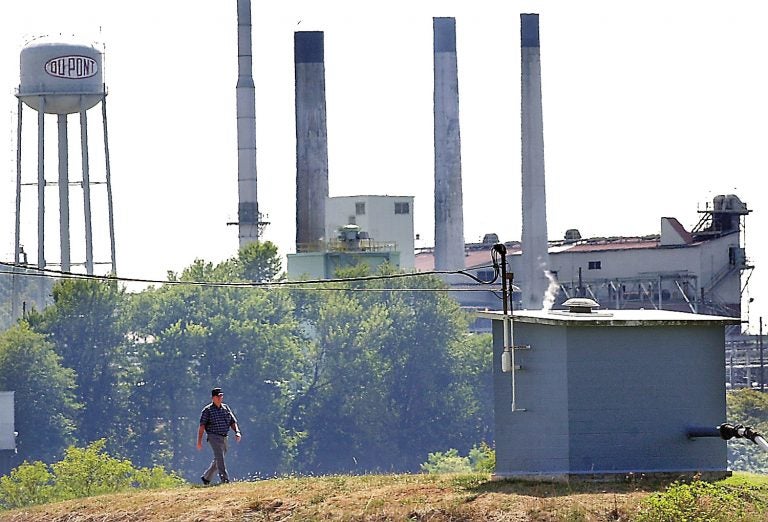DuPont execs react to villain role in ‘Dark Waters’ film
Company executives react to DuPont’s role as the villain in a new film about chemical contamination starring Mark Ruffalo and Anne Hathaway.

**FILE** DuPont Washington Works plant along Ohio River in Parkersburg, W. Va. is shown in this undated file photo. (AP Photo/The Marietta Times)
A lawyer’s efforts to reveal chemical contamination around DuPont’s facility in Parkersburg, West Virginia, will hit theaters later this month. “A tenacious attorney (Ruffalo) uncovers a dark secret that connects a growing number of unexplained deaths due to one of the world’s largest corporations,” the film’s synopsis says.
The movie stars Mark Ruffalo as that tenacious lawyer, Rob Bilott, with Anne Hathaway as his wife. Bilott investigated DuPont’s use of perfluorooctanoic acid, or PFOA, at its Washington Works plant in West Virginia on the Ohio River.
There’s no question who the villain is for Ruffalo’s protagonist. In a trailer for the film, a DuPont executive repeats the company’s longtime slogan, “Better Living Through Chemistry,” accompanied by sinister-sounding music. “DuPont is knowingly poisoning 70,000 local residents for the last 40 years,” Ruffalo’s character says in the trailer.
The movie is “inspired by a shocking true story,” according to the synopsis from Focus Features, which is distributing the film. It’s that phrase “inspired by” that DuPont executives hope to use to distance the company from an ugly part of its recent past.
“The movie is not true facts, I think the trailer I saw was ‘inspired by,’” said DuPont executive chairman Ed Breen, who spoke about the film during a conference call for investors on Thursday. “I’ve had a pretty good debriefing on it, and it’s just not true material in it.”
Though the film may not be 100% accurate, the New York Times Magazine article it’s based on makes a damning argument against DuPont and how the company covered up its use of PFOA in West Virginia. It also shows how much the company knew about the negative health effects the chemical posed.
The 2016 article, “The Lawyer Who Became DuPont’s Worst Nightmare,” details attorney Bilott’s fight to expose that DuPont knew about the dangers of PFOA for decades:
But over the decades that followed, DuPont pumped hundreds of thousands of pounds of PFOA powder through the outfall pipes of the Parkersburg facility into the Ohio River. The company dumped 7,100 tons of PFOA-laced sludge into ‘‘digestion ponds’’: open, unlined pits on the Washington Works property, from which the chemical could seep straight into the ground. PFOA entered the local water table, which supplied drinking water to the communities of Parkersburg, Vienna, Little Hocking and Lubeck — more than 100,000 people in all.
In 2017, DuPont and its spinoff company Chemours agreed to settle a lawsuit with roughly 3,500 people living near the Parkersburg plant in both West Virginia and Ohio. The company agreed to pay $671 million.
DuPont isn’t planning a big public-awareness campaign to tell its side of the story as a dark part of company history is dramatized on the big screen.

“Unfortunately, in a situation like this, it just doesn’t do you much good to fight it out in the public eye. That would just drive more and more attention to it,” said DuPont CEO Mark Doyle. “We’re really focused internally on our employees, our communities, our families. Getting the facts out there, preparing people for the bad publicity that’s likely to come.”
Breen wouldn’t comment on whether DuPont would take legal action in response to the movie, but he did tell investors, “Obviously, we have a lot of legal folks [that] have been looking at this.”
“Dark Waters” will be released in theaters on Nov. 22.
WHYY is your source for fact-based, in-depth journalism and information. As a nonprofit organization, we rely on financial support from readers like you. Please give today.





